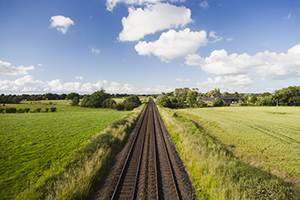In 2020, let’s embrace the change
We are living in an era of unprecedented change and 2020 is going to be no different.
 The biggest change, one that presents a challenge to all of humanity, is climate change. The five warmest years on record have taken place since 2010. Global sea level rose about 8 inches in the last century.
The biggest change, one that presents a challenge to all of humanity, is climate change. The five warmest years on record have taken place since 2010. Global sea level rose about 8 inches in the last century.
I am determined that the railway is a central part of the UK’s target to produce net zero carbon emissions by 2050.
As an industry, we can and do get people out of their cars, get freight off lorries, cut pollution, congestion and carbon emissions. And we can do more of it – more electrification, more services on more routes, more new and refurbished greener trains, as part of a fully integrated, low-carbon, mass transport system.
The technology challenge
Then there’s the change brought about by technology. Automation is all around us, happening in every area of life. It is a step-change like that between the Casio digital watch of the 1970s and the smartphone in our pockets right now.
We need to manage automation, guide the technological revolution, ensure its benefits are spread fairly and the risks are pooled.
‘Work’ is increasingly an activity we do, not a place we go to. People demand more flexibility. So, the railway needs to adapt to demands for travel at different times not just the rush hour.
That’s why we’re moving forward with a simplified, transparent reform of fares, and arguing for a step-change so that tickets reflect actual journeys, and customers know they can get the best available price for every part of their journey.
The population challenge
It’s not just technological change – we are changing as a nation. Our population is getting larger. Forecasts suggest that in a little over a decade the UK will be home to 70 million people.
As well as more people, there will be new towns and suburbs for the railway to serve. We anticipate passengers doubling again in coming years, and we need to be ready.
We are also getting older as a society. The ONS projects that the proportion of people aged over 85 years will almost double over the next 25 years.
Again, we need to be ready – demands from a huge non-working section of the population, with different needs for access and ease of travel, using the railway, not for work but for leisure.
That’s why a major project such as HS2 is so important to meet these needs, why we plan to introduce over 11,000 more services cross the country over eight years, and why the investment decisions we make today will impact on our ability to deliver tomorrow.
The millennial challenge
 Many of these new customers will have been born in the twenty-first century, brought up on Spotify, AirBnB and Deliveroo, with instant access to information and services.
Many of these new customers will have been born in the twenty-first century, brought up on Spotify, AirBnB and Deliveroo, with instant access to information and services.
This new generation rightly demands higher standards of ethics and transparency, which successful corporations are embracing. The companies running the railway must reconnect with and justify themselves to this new generation on its terms.
This is one reason why rail companies have designed and implemented Wavelength – our customer satisfaction improvement programme. It is designed to measure customer satisfaction weekly, providing accurate, fresh performance data. It means that action can be taken more quickly, reducing the traditional lag between insight and improvement.
Thousands of new and refurbished carriages with better technology will also make journey planning easier, ensuring we provide more accurate information at people’s fingertips.
The railway system challenge
All of these challenges mean that a railway system designed more than a quarter of a century ago is in need of major change. We are proud of what we’ve achieved over the past two decades, but we are never complacent.
In 2018, we asked for a top-level review of the railway, because we knew that everything from fares to franchises needs reform.
It is apparent that there is an emerging consensus on some areas – the need for a strategic body to oversee the railway, a new look at how services are contracted, more integration between rail, bus, tube, metro, ferries, cycling and walking, and reform of the fares system to enable it.
Change on this scale presents the opportunity for us to renew our social licence, our right to exist, our permission from the public. To show we get it and that we care about people and the environment. That we can be a force for progress.
In a world that seems increasingly polarised – this blog hasn’t even mentioned the ‘B word’ – it’s apparent that when it comes to the railway we all want the same thing: a world-class service, woven deep into the fabric of the nation, delivering economic and social benefits to our growing population, and helping to stem the tide of climate change. In 2020, let’s embrace the change needed to turn that into reality
Paul Plummer, Chief Executive, RDG